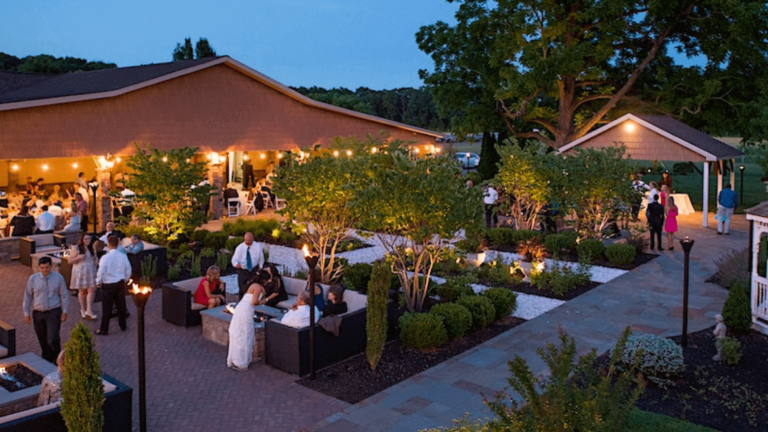It’s an exciting time to start a wedding venue: 2022 was the biggest year for weddings since 1984!
But a lot goes into opening your own events space, from obtaining licenses to marketing to finding that special something that makes your wedding venue unique.
Eventbrite helps hundreds of thousands of event creators host weddings and other events at their venues. In this guide, we’ll will walk you through all the most important steps to start, promote, and run a wedding venue.
With enough planning and preparation, you can be ready to host weddings in no time.
Table of Contents
2. Identify and prepare your venue
3. Apply for licenses and insurance
Stay on top of wedding industry trends

1. Set a budget
Before you can start on anything else, you need to know how much money you can expect to spend. When setting a budget for your wedding venue, there are several factors to consider.
Some of these costs will be fixed and easy to predict, while others may vary widely depending on what you prioritize and external factors. That’s why we researched the standard costs for each of these expenses. Below, we crunched the numbers to show youyou can find how much of your budget each of these factors might take up:
- Lease or mortgage costs: 40% to 60%
- Licenses and insurance: 2% to 5%
- Monthly maintenance and utility costs: 10% to 15%
- Advertising and marketing, including website building and market research: 20% to 30%
- Furniture, decor, other supplies and equipment: 5% to 15%
How to estimate your wedding venue costs
You can do research in a few ways to get a more accurate estimate of your costs. To start, consider reaching out to other venues in the area. They’ll be able to give you locally accurate information on the costs of things like furniture and repair contractors. Use an events search engine like Eventbrite to find the organizers behind the kinds of events you want your venue to specialize in, and find out what vendors they used.
You can also contact those suppliers directly to get a more precise picture of what it will cost to get the venue ready for business.
Finally, research industry standards for pricing, which is useful for costs that aren’t dependent on local factors, such as digital marketing. For example, look at the Eventbrite marketing suite, which has a transparent pricing model.
How to calculate wedding venue ROI
Return on investment (ROI) is how much money you make from the money you spend on your venue. To calculate your ROI, you’ll take your total revenue divided by the total costs and multiply that by 100. That will give you your ROI as a percentage of the money spent.
Couples spend an average of $3,000 on their venue, which gives you a rough idea of how much you could make per wedding. Of course, your actual ROI depends on how you price your own venue and the number of events you book.

2. Identify and prepare your venue
The location, building, and facilities are everything when it comes to a wedding venue — literally. When deciding on a location, consider what soon-to-be-wed couples will be looking for in a venue, such as:
- Access to public transportation and parking
- Distance from major population centers
- Location in a scenic area or with good views
- Facilities for events such as a dance floor, stage, kitchen, and seating
- Availability of catering services, event planning support, and other amenities
Buying vs. leasing a wedding venue
Another thing to consider is whether you’ll buy or lease the space. Many people starting venues choose to buy so they can build equity in the venue. They’re also attracted to the fixed costs, control over how they change the property, and potential tax benefits of being a property owner. Buying also gives you the opportunity to use the venue for other purposes if you decide to pivot your strategy.
However, ownership does come with some drawbacks. Here are some reasons why you might want to lease your venue instead:
- Lower starting costs
- Flexibility to change locations without selling the property
- Reduced maintenance responsibilities
- Shorter-term commitment
- Opportunity to test different locations
Considerations for wedding venue repairs
Repairs can take time and a big chunk of your budget, so if you decide to buy, it’s best to identify any necessary upgrades and get quotes before signing on the dotted line. If you choose to hire a contractor to do the work for you, you can reach out to other local venues to see who they trust and recommend.
Hiring a contractor to help prepare your venue has a few advantages:
- Faster work schedule
- Work done by certified professionals
- Opportunity for consultation from experts
But you might decide on a do-it-yourself (DIY) approach instead. If you DIY your repairs, you know the work will be completed to your standards and there won’t be any high labor costs. It’s also easier to pivot your decision-making in the middle of the project if you’re doing it yourself.

3. Apply for licenses and insurance
Once you’ve settled on a location, you’re ready to start applying for the licenses and insurance you’ll need to operate. This will depend both on how you plan on using your venue and on local regulations. You should be able to find the information you need from your local small business development center and the federal small business administration website.
The types of licenses and insurance you might need include:
- Business license
- Liquor license
- General liability insurance
- Property insurance
- Noise permits
- Conditional use permit
You may want to consider whether the time it would take you to complete those applications outweighs the cost of hiring a legal professional to handle them for you.

4. Conduct market research
It’s important to do research on your target market to make sure your wedding venue business will be sustainable.
A few ways to conduct market research are through:
- Surveys
- Focus groups
- Interviews
For example, couples often consider their wedding budget when looking for venues. If your market research finds that your venue is out of the price range of most couples, you may have difficulty finding customers. You can research the typical wedding budget for your area and see if there’s room to adjust your prices or venue packages in order to accommodate more potential customers.
You’ll also want to think about what kind of theme or vibe you want your venue to have. This will help set the tone for how you market your venue, and give couples an idea of what kind of experience they can expect.

5. Add a standout element
You want couples who are looking for venues to remember yours, so consider how you might make your wedding venue unique. That could be anything from special services like catering or transportation, to the physical location itself, to facilities for serving specific types of weddings. Some venues even go out of their way to market themselves as “nontraditional venues.”
For example, if your community has a large immigrant population, you might offer bilingual ceremony services or different regional cuisines on your menu.
Here are a few examples of how venues featured on Eventbrite have made their wedding spaces stand out:
- The Garden Venue: Fire tables, waterfalls, and other decorations included
- Zorvino Vineyards: Dining and wine tasting on-site
- Forest Hall: Picturesque, forested location
- Heartland Lodge: Extensive decor inventory included
- Chillicothe Country Club: Discounted rates for club members
- The Schoolhouse: Unique, historical building

6. Market your venue
Once you have your budget, venue, licenses, research, and standout element, you’re ready to start marketing. Because this is so integral to the success of your wedding venue, we’ve broken down the most important wedding venue marketing tips in detail.
Build and optimize your website
First, you’ll want to make sure your wedding venue website looks attractive and professional. You don’t have to spend a lot of money on design services, though — there are many affordable, beginner-friendly web-building tools that you can use to create a beautiful website without breaking the bank.
You’ll also want to make sure your website is optimized for search engines. That means using relevant keywords in your headers and meta descriptions, and making sure the website is responsive and mobile-friendly.
Consider starting a blog to share wedding planning tips and attract more traffic to your website. You can even drive traffic to your website from your Eventbrite organizer page, where you can list the website and any social media links you have.
Finally, make it easy for couples to get in touch with you. A contact form, phone number you’ll answer at any hour, and active social media accounts will go a long way toward giving potential customers the information they need to book your venue.

Invest in digital and print marketing
Digital marketing helps you reach your target audience and can be very cost-effective. Social media in particular is invaluable when it comes to marketing a wedding venue, especially if you have high-quality, engaging photos to show off.
You’ll want to post regularly on your social media accounts with photos of previous events at your venue, as well as helpful tips for couples planning weddings (along with a link to your blog!). You can even use marketing tools like the Eventbrite’s to reach potential customers by targeting specific demographics and locations.
Email marketing is another good way to engage your target audience. To build up your email list, include a call-to-action (CTA) button on your homepage. You can also add blog posts encouraging people to sign up to receive venue updates and wedding planning tips. Then you can send them a newsletter with helpful content and links to your blog posts. You can even automate that outreach using Eventbrite’s integration with MailChimp.
Print marketing can also be an effective way to reach potential customers. (No, really!) Consider creating flyers or postcards with pictures of your venue and information about the services you offer. You can mail them out in areas where your potential customers may live.
Adjust for audience preferences
Once you’ve begun your marketing efforts, make sure to adjust for what resonates most with your audience. Track data from your website, email campaigns, and other sources to see how people are responding. You can do this easily with Eventbrite’s marketing tools, where you can get live reporting on the performance of your marketing campaigns.
One key part of a good marketing strategy is to A/B test your campaigns to maximize your ROI. To run an A/B test (also called a split test), create two versions of a piece of marketing and see which performs best. You can monitor this through live reporting too. Once you’ve identified what works and what doesn’t, you can tailor your marketing accordingly.

Make industry connections
Your wedding venue’s success will be determined partly by your relationships within the industry. That’s because having contacts that can help spread the word about your venue brings referral business — or free marketing. Here are a few kinds of vendors you could connect with on Eventbrite’s vendor marketplace:
- DJs
- Florists
- Musicians
- Caterers
- Wedding planners
- Equipment rental stores
- Photographers/videographers
You can start small by reaching out to local vendors you’d like to work with. You can also search Eventbrite to identify vendors working with other events in your area.
And don’t forget about using review websites. If a vendor was a pleasure to work with, they’ll certainly appreciate the positive note, and it could make them more likely to give you a referral too.

Attend industry events
Getting out there and meeting potential customers in person can be invaluable for a wedding venue, so consider attending industry events such as bridal shows, wedding expos, or events for related professional services. To find them, just search for relevant events in your area using Eventbrite.
You’ll want to make a good first impression, so invest in high-quality displays and materials to show off your venue. You can also offer discounts or other incentives to entice couples to book at the event.
Create events to attract event planners
Event planners are a great resource when it comes to marketing wedding venues. They often have influence over which venues couples choose, and they’re usually well-connected in the industry. Consider hosting events specifically for event planners, such as open houses like the one offered by the Hard Rock Hotel New York or networking mixers like the one the Oahu Wedding Association held at a local hotel ballroom.
You can use Eventbrite to create these events easily, and then invite event planners and other industry contacts to attend. It’s a great way to show off your venue, as well as make connections with potential partners who can help spread the word about your wedding venue business.

Diversify your audience
Remember, you don’t have to limit your venue to only hosting weddings — branch out and market your venue for a wider range of events. This can bring in new revenue streams and lead to word-of-mouth marketing for your venue. It can also help keep revenue flowing during the slow wedding seasons of winter and spring, when only 23% of weddings take place.
Some of the other event types you can host are:
- Family reunions
- Religious celebrations (e.g. first Communions and bar/bat mitzvahs)
- Anniversary parties
- Birthdays
- Retirement parties
You could even expand your audience to corporate or nonprofit events, or market your venue for special events such as outdoor movie screenings, art shows, or concerts. To reach new audiences, use Eventbrite Ads to connect with people looking for venues just like yours.
Diversifying your event offerings will help you reach a wider audience and make sure that more potential customers know about your venue.

7. Throw a showcase event
One of the best ways to show off your venue is by hosting a showcase event. It should include features that make it unique, including decorations, music, and catering.
To throw a great showcase event, partner with a variety of vendors. Make sure to have at least one of each of the following:
- Caterers
- DJs or musicians
- Bartenders
- Florists
- Photographers/videographers
That way, your venue will be just as lively as it is when you host events. A showcase event can attract couples beginning their wedding planning and vendors looking to partner with you. That’s exactly why venues like Ripley Castle throw showcase events themselves.
Make sure to advertise your event to get the most attendees possible! With Eventbrite Ads, you can promote the event on search engines and target the ads to people looking for exactly the kind of event you’re planning.
Stay on top of wedding industry trends
It’s essential to keep up with industry trends when you’re running a wedding venue. Subscribe to wedding publications and follow wedding vendors and other industry experts on social media so you’re always up to date with the latest thing.
Download Eventbrite’s 2023 Event Trends Report — by having the most up-to-date information at your fingertips, you can easily stay ahead of any industry changes or innovations and make sure you maintain a competitive edge.
Want to analyze your own events to understand what works best for you? With Eventbrite’s data analytics tools you can do just that.
Simplify your wedding event business with Eventbrite






